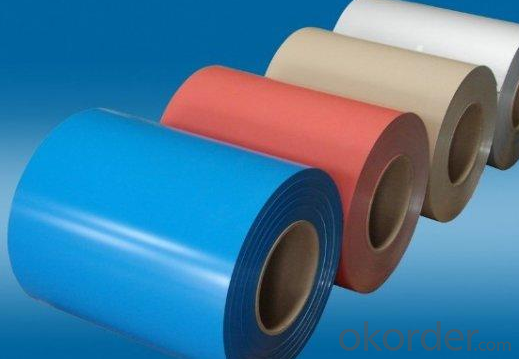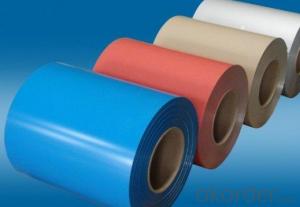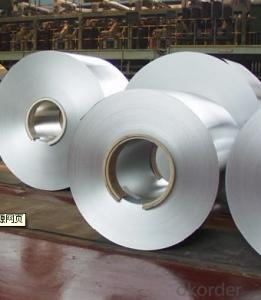Thickness: 0.15 - 2.0 mm
Technique: Hot Rolled
Application: Container Plate
Surface Treatment: Galvanized
Secondary Or Not: Non-secondary
Certification: CE
Special Pipe: Thick Wall Pipe
Alloy Or Not: Non-alloy
Section Shape: Other
Galvanized Steel Coil Cold Rolled CS Type B CNBM
- Loading Port:
- Guangzhou
- Payment Terms:
- TT OR LC
- Min Order Qty:
- 20 m.t.
- Supply Capability:
- 3000 m.t./month
OKorder Service Pledge
OKorder Financial Service
You Might Also Like
1.Quick Details:
2.Packaging & Delivery
| Packaging Details: | standard package |
|---|---|
| Delivery Detail: | 1-4 week |
cold rolled galvanizing steel coil
galvanized iron steel coil
Thickness | 0.15mm--2.0mm |
Width | 50--1250mm |
Zinc Coating | 40gsm—275gsm |
Spangle | Big, small regular spangle and zero spangle |
Surface Treatment | Chromate, Galvanized, Skin Pass, Passivity and Oiled(un-oiled) |
ID | 508mm or 610mm |
Coil Weight | 3--7 Metric Tons and as requirements |
Production | 12,000 metric tons per month |
More information of Galvanized Steel Coils/GI/PPGI/HDG | |
Payment Term | T/T or L/C (We usually charge 30% of the deposit first.) |
Delivery Port | Qingdao Port or Tianjin Port |
Delivery Time | Within 20 days after receipt of T/T or L/C |
MOQ | 25 metric tons or one 20 feet container |
Application | General use, Color coating, Corrugated Roofing making, Outside of the buildings Structure, Deep Drawing and etc. |
Ambition | Reliable product, Competitive price, On-time delivery and High standard service. |

5.What is the application of Steel Coil?
There are two sides,one is out side: Workshop, agricultural warehouse, residential precast unit, corrugated roof, roller shutter door, rainwater drainage pipe, retailer booth;the other is inside: Door, doorcase, light steel roof structure, folding screen, elevator, stairway, vent gutter.
- Q:What are the different types of coatings applied to steel coils?
- There are various types of coatings that can be applied to steel coils, each with its own specific purpose and benefits. 1. Galvanized Coating: This is one of the most common types of coatings applied to steel coils. It involves the application of a layer of zinc to the steel surface. Galvanized coatings provide excellent corrosion resistance, making them suitable for outdoor applications where the steel may be exposed to moisture or harsh environmental conditions. 2. Galvalume Coating: Similar to galvanized coating, galvalume coating also involves the application of a layer of zinc to the steel surface. However, it also includes a small amount of aluminum, which enhances the corrosion resistance and provides better heat reflectivity. Galvalume coatings are often used in roofing and cladding applications. 3. Pre-painted Coating: Pre-painted coatings involve the application of a layer of paint or primer to the steel surface. This type of coating allows for customization in terms of color and finish. Pre-painted coatings not only enhance the aesthetics of the steel but also provide additional protection against corrosion and weathering. 4. Organic Coating: Organic coatings are typically applied as a topcoat over a galvanized or galvalume coating. They are made of various resins, such as polyester, epoxy, or polyurethane, which provide additional protection against corrosion, abrasion, and chemicals. Organic coatings are commonly used in applications where both aesthetics and durability are important, such as in the automotive industry. 5. Metallic Coating: Metallic coatings, such as aluminum or zinc, are applied to steel coils using a process called hot-dip coating. These coatings provide excellent corrosion resistance and are commonly used in applications where the steel is exposed to high temperatures or corrosive environments. 6. Chromate Conversion Coating: Chromate conversion coatings are applied to steel coils primarily for their corrosion resistance properties. They are commonly used in electrical applications to protect against galvanic corrosion and improve conductivity. Overall, the type of coating applied to steel coils depends on the specific requirements of the application, including the desired level of corrosion resistance, aesthetics, and environmental factors.
- Q:How are steel coils used in the manufacturing of storage tanks?
- Steel coils are used in the manufacturing of storage tanks as they are rolled into cylindrical shapes and welded together to form the tank's body. The coils provide strength and durability to the structure, ensuring the tank can withstand the pressure and weight of stored materials.
- Q:Ok, I need two negative facts about steel wheels and two for aluminum wheels. im designing a wheel for a project in design and draw for production class. Also if you find a web site that you got the info from plz refrence it i need to write down the source of the info, but if you can't its ok. Thanks
- Negative facts for steel wheels: (1) Not as many style choices as aluminum. (2) Rust easily even when painted or powder coated, due to rock chips. (3) Heaver than aluminum, as far as fuel economy. Negative facts for aluminum wheels: (1) More sensitive to proper torquing of lug nuts. IE torque must be checked more often. (2) Susceptible to impact damage from road hazards much more than steel. (3) Need constant attention to prevent oxidation. Are these what you are looking for? I hope so. Wingman
- Q:What are the common welding defects in steel coils?
- There are several common welding defects that can occur in steel coils during the welding process. These defects include: 1. Porosity: This is characterized by small holes or voids in the weld metal, which are caused by gas entrapment during the welding process. It can weaken the weld and make it more susceptible to corrosion. 2. Lack of fusion or incomplete penetration: This defect occurs when there is inadequate fusion between the base metal and the weld metal, or when the weld metal does not fully penetrate the joint. It can result in a weak or brittle weld. 3. Cracks: Cracks can occur in the weld metal or in the heat-affected zone (HAZ) of the base metal. They can be caused by factors such as high stress levels, improper cooling, or inadequate preheating. Cracks can significantly reduce the strength and integrity of the weld. 4. Undercutting: Undercutting is a groove or depression that forms at the toe of the weld due to excessive melting of the base metal. It weakens the weld and can lead to stress concentration and potential failure. 5. Excessive spatter: Spatter refers to the small droplets of molten metal that are expelled from the welding arc and can land on the surface of the steel coil. Excessive spatter can result in a rough or uneven surface finish and may require additional cleaning or grinding. To minimize these welding defects in steel coils, it is important to ensure proper weld preparation, including cleaning and removing any contaminants from the surface of the steel. Additionally, using the correct welding parameters, such as appropriate heat input and travel speed, can help to minimize defects. Regular inspection and quality control measures can also help to identify and address any defects before they become more serious issues.
- Q:why were guns, germs and steel absent within America?
- i dont really understand this question but if it means to how it was before then it was absent because the native americans were not into technology so they obviously had no guns created that was something that they had traded to get from europe as for the germs i ddo not know about thta really except for if it means that common disease and one of the diseases most used in history books is malaysa from mosquitos but when they had traded with europe they got all sorts of diseases now for steel the only reason i remember them traveling for is for gold and i dont remember them ever looking for it until 13 colonies were established as you can see im not exactly sure about germs and steels but i know that the guns part is correct
- Q:What are the different types of coil leveling machines?
- There are three main types of coil leveling machines: precision levelers, corrective levelers, and stretcher levelers.
- Q:What is the shelf life of steel coils?
- Various factors, such as the type of steel, its specific application, and the storage conditions, can affect the shelf life of steel coils. Generally, steel coils have a lengthy shelf life due to their durability and resistance to corrosion. When stored correctly in a dry and controlled environment, steel coils can maintain their quality for many years. It is important to consider that certain types of steel, like galvanized steel, may have a shorter shelf life if the protective coating is compromised and corrosion occurs. Additionally, exposure to extreme weather conditions, high humidity, or chemicals can reduce the shelf life of steel coils. To ensure the longevity of steel coils, it is advisable to store them in a covered area to protect them from moisture and direct sunlight. Proper stacking and handling techniques should also be employed to prevent any damage that could lead to premature deterioration. In conclusion, the shelf life of steel coils can vary, but with appropriate storage and handling, they can remain in good condition for an extended period. This makes them a reliable and long-lasting material for various applications.
- Q:I was wondering if steel cases can be loaded to the same pressure as brass cases. Are the cartridges that commonly feature steel cases like the Russian 5.45x39, 7.62x39 and 7.62x54R loaded to a lower pressure than their C.I.P. MAPs (380 MPa, 355 MPa, 390 MPa --gt; 51,488 psi to 56,564 psi)? There must be a reason why most NATO armies use brass cases...
- Steel cases are harder to manufacture, but cheaper in material. Loaded? Yes. Those cases are a very mild steel, and will 'flow' well enough to seal at the pressures involved. The question might come up with low pressure loads though. RE-loaded?? - I wouldn't try it, even if they weren't berdan primed.
- Q:What are the common coil lengths available for steel coils?
- The common coil lengths available for steel coils vary depending on the industry and specific requirements. However, some standard coil lengths are commonly used across various applications. These include coil lengths of 100 feet (30.48 meters), 200 feet (60.96 meters), 300 feet (91.44 meters), and 500 feet (152.4 meters). These lengths are often used in industries such as construction, manufacturing, and automotive, where steel coils are widely used for various purposes. It is important to note that coil lengths can also be customized based on specific project needs or customer preferences.
- Q:i have a white spot on my stainless steel stove, its on the part behind the burners where the oven controls are, does anyone know what it may be and how to remove it. i have tried soap and water and stainless steel cleaner but neither worked. thanks!
- Baking soda mixed with liquid dish soap can make a good paste to gently rub on stains. Be sure to rinse the stainless steel surface thoroughly, and towel dry. If the stains still remain you can try vinegar. Remember to thoroughly rinse and towel dry. If stains still remain I recommend trying a stainless steel cleaner and polisher. Barkeeper's Friend is a good powder formula that can clean without scratching. Be sure to follow the directions, rinse thoroughly, and towel dry. These methods should help remove the discolorations
1. Manufacturer Overview |
|
|---|---|
| Location | |
| Year Established | |
| Annual Output Value | |
| Main Markets | |
| Company Certifications | |
2. Manufacturer Certificates |
|
|---|---|
| a) Certification Name | |
| Range | |
| Reference | |
| Validity Period | |
3. Manufacturer Capability |
|
|---|---|
| a)Trade Capacity | |
| Nearest Port | |
| Export Percentage | |
| No.of Employees in Trade Department | |
| Language Spoken: | |
| b)Factory Information | |
| Factory Size: | |
| No. of Production Lines | |
| Contract Manufacturing | |
| Product Price Range | |
Send your message to us
Galvanized Steel Coil Cold Rolled CS Type B CNBM
- Loading Port:
- Guangzhou
- Payment Terms:
- TT OR LC
- Min Order Qty:
- 20 m.t.
- Supply Capability:
- 3000 m.t./month
OKorder Service Pledge
OKorder Financial Service
Similar products
New products
Hot products
Hot Searches
Related keywords




























